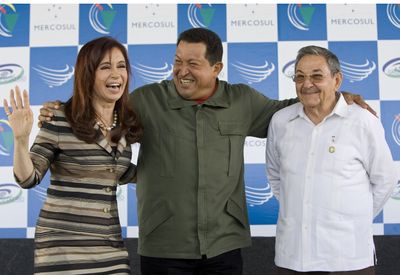U.S. notably absent at Latin America summit
Leaders welcome Castro, laud shift to the left

COSTA DO SAUIPE, Brazil – Forget the global economic crisis and climate change. What Latin American leaders are talking about is who is not at Tuesday’s summit: the United States or any other outside power.
The largest hemispheric summit to exclude U.S. representation was hailed by Washington’s most vocal critics as a sign that Latin America is demanding a new independence from the superpower to the north.
Cuba’s integration into the Rio Group – after it was expelled from the Washington-based Organization of American States in 1962 – only added to the buzz about a new era.
“The presence of Cuba is a very strong signal that America is no longer the boss in Latin America,” Venezuelan President Hugo Chavez told reporters upon his arrival at the summit, which drew 33 heads of state or their representatives.
Brazilian President Luiz Inacio Lula da Silva, a center-leftist, praised South America’s tilt to the left that coincided with the U.S. Bush administration and a general feeling in Latin America that he neglected the region.
Silva insisted the continent is coming into its own with elections in recent years of leaders like Evo Morales, a socialist and Bolivia’s first Indian president, and Paraguay’s Fernando Lugo, a former bishop who spent much of his life ministering to the poor.
“There was a time when our friend Chavez was all alone,” Silva said. “Who would have imagined 10 years ago our beloved Evo Morales as president? Who would have thought that a liberation theology bishop could become Paraguay’s president?”
Chavez and other leaders said the election of Barack Obama as U.S. president creates a key opportunity for South American countries to speak with their own voice and to demand respect in a new dialogue with the United States.
“The important thing is that we are here together, without the patronage of the empire,” Chavez told Venezuelan state television, referring to the U.S. “The way is beginning, a new way – our way from the South.”
The two-day summit called to focus on regional responses to crises in finance, food and environment so far was long on verbiage and short on action.
An opening meeting of South America’s Mercosur leaders – Argentina, Brazil, Paraguay and Uruguay – only highlighted the issues that divide countries in the region. They were unable to agree on a reform to eliminate dual tariffs on imported goods.
Meanwhile, Ecuador has been engaged in a fight with Brazil over debt payments for a problematic hydroelectric project. Paraguay is angry about recent Brazilian military exercises near the two nations’ border, and Venezuela has challenged Brazil’s idea for a regional defense council by inviting the Russian Navy to visit.
At the opening of meetings in northeast Brazilian state of Bahia, officials blamed developed nations for the economic crisis.
Ecuador’s President Rafael Correa – who in recent days defaulted on $60 million in sovereign debt – called for a stronger Bank of the South, a regional development agency.
Cuban President Raul Castro held bilateral meetings with Mexico’s Felipe Calderon and was expected to do so today with a vice president of Colombia – two nations Cuba has been at odds with.